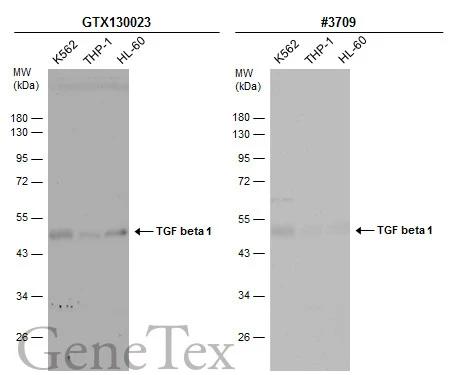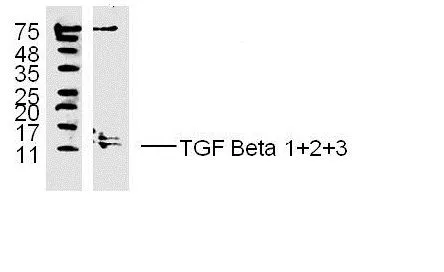![Sandwich ELISA analysis of human Latent TGF- beta1 protein using GTX03004 TGF beta 1 antibody [MT593] as coating antibody and GTX03003-02 TGF beta 1 antibody [MT517] (Biotin) as detecting antibody. Sandwich ELISA analysis of human Latent TGF- beta1 protein using GTX03004 TGF beta 1 antibody [MT593] as coating antibody and GTX03003-02 TGF beta 1 antibody [MT517] (Biotin) as detecting antibody.](https://www.genetex.com/upload/website/prouct_img/normal/GTX03003-02/GTX03003-02_20210507_ELISA_w_23053123_319.webp)
Sandwich ELISA analysis of human Latent TGF- beta1 protein using GTX03004 TGF beta 1 antibody [MT593] as coating antibody and GTX03003-02 TGF beta 1 antibody [MT517] (Biotin) as detecting antibody.
TGF beta 1 antibody [MT517] (Biotin)
GTX03003-02
ApplicationsELISA
Product group Antibodies
ReactivityHuman, Monkey
TargetTGFB1
Overview
- SupplierGeneTex
- Product NameTGF beta 1 antibody [MT517] (Biotin)
- Delivery Days Customer9
- Application Supplier Note*Optimal dilutions/concentrations should be determined by the researcher.Not tested in other applications.
- ApplicationsELISA
- CertificationResearch Use Only
- ClonalityMonoclonal
- Clone IDMT517
- Concentration0.5 mg/ml
- ConjugateBiotin
- Gene ID7040
- Target nameTGFB1
- Target descriptiontransforming growth factor beta 1
- Target synonymsCED, DPD1, IBDIMDE, LAP, TGF-beta1, TGFB, TGFbeta, transforming growth factor beta-1 proprotein, TGF-beta-1, latency-associated peptide, prepro-transforming growth factor beta-1, transforming growth factor beta1
- HostMouse
- IsotypeIgG1
- Protein IDP01137
- Protein NameTransforming growth factor beta-1 proprotein
- Scientific DescriptionThis gene encodes a secreted ligand of the TGF-beta (transforming growth factor-beta) superfamily of proteins. Ligands of this family bind various TGF-beta receptors leading to recruitment and activation of SMAD family transcription factors that regulate gene expression. The encoded preproprotein is proteolytically processed to generate a latency-associated peptide (LAP) and a mature peptide, and is found in either a latent form composed of a mature peptide homodimer, a LAP homodimer, and a latent TGF-beta binding protein, or in an active form consisting solely of the mature peptide homodimer. The mature peptide may also form heterodimers with other TGFB family members. This encoded protein regulates cell proliferation, differentiation and growth, and can modulate expression and activation of other growth factors including interferon gamma and tumor necrosis factor alpha. This gene is frequently upregulated in tumor cells, and mutations in this gene result in Camurati-Engelmann disease. [provided by RefSeq, Aug 2016]
- ReactivityHuman, Monkey
- Storage Instruction-20°C or -80°C,2°C to 8°C
- UNSPSC12352203





![Sandwich ELISA analysis of human Latent TGF- beta1 protein using GTX03004 TGF beta 1 antibody [MT593] as coating antibody and GTX03003-02 TGF beta 1 antibody [MT517] (Biotin) as detecting antibody.](https://www.genetex.com/upload/website/prouct_img/normal/GTX03004/GTX03004_20210507_ELISA_w_23053123_112.webp)
![Sandwich ELISA analysis of human Latent TGF-帣1 protein using GTX03004 TGF beta 1 antibody [MT593] as coating antibody and GTX03003-02 TGF beta 1 antibody [MT517] (Biotin) as detecting antibody.](https://www.genetex.com/upload/website/prouct_img/normal/GTX03110/GTX03110_20210507_ELISA_w_23053123_419.webp)

![FACS analysis of A549 cells using GTX60614 TGF beta 1 antibody [7F6]. Green : TGF beta 1 Red : negative control](https://www.genetex.com/upload/website/prouct_img/normal/GTX60614/GTX60614_20170912_FACS_w_23061123_203.webp)